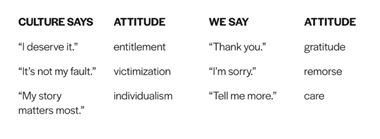Rod Wilson Shares How Three Sacred Phrases Can Change the World

My children are ages 5 and 3. They love each other just as fiercely as they fight, and the typical routine is to separate them and ask the offender to apologize. When I first started doing this routine, whomever was asked to apologize would protest, but now they say, “Sorry,” immediately. It is impossible for me to know whether they truly feel remorse for what they have done, or just apologize because that is what is expected of them.
Likewise, if you were to give a gift, a sweet, or serve a meal to my children, they would say “Thank you”. Many people have remarked on what good manners they have, and how proud my husband and I should be for rearing them well. What those people do not see is the tantrum that occurs if they don’t get what they want. When they do not receive what they expect to, their instant expression of thanks gets replaced by indignation. They might say, “Thank you” in most circumstances simply because it’s what they are supposed to do, not how they truly feel. They do this because I do, and that is how I have taught them.
In the excellent new book, Thank You. I'm Sorry. Tell Me More, Rod Wilson explores these three phrases, and how they can change our lives by changing our perspective. He declares that when we say, “Thank you,” we are acknowledging the way others impact us. When we say, “I’m sorry,” we acknowledge the way we impact others. And when we say, “Tell me more,” we acknowledge the way we impact each other. Through this acknowledgement, we are caring for the person by seeing them, affirming that they matter, and taking responsibility for any offense we may have caused.
Political, racial, and ethical tensions seem to be a constant flowing undercurrent in our lives right now, and are a reminder of how we are different from others. Many of us are just exhausted. We do not care how we are impacting each other, and are focused on how others are impacting us instead. Wilson says, “The more we pretend we don’t have influence on one another, the more deeply entrenched cultural norms keep us from truly seeing each other.” If we cannot truly see each other, then no type of healing can happen, and the divisions between us will deepen. He challenges us to utilize the phrases “Thank you,” “I’m sorry,” and “Tell me more,” to replace the three normalized principles of entitlement, victimization and individualism of today.

When we say, “Thank you,’” we bring a posture of gratitude in a present culture of entitlement. When we say, “I’m sorry,” we bring an attitude of remorse in a culture of victimization. When we say, “Tell me more,” we bring a perspective of care in a culture of individualism.
We are more connected than ever in history, yet loneliness and isolation increase - how can this be? We are alone together through a filter and screen, and authenticity is nullified. It is so easy to talk at each other through the internet, getting what we need from others and moving on, offering nothing in return. We talk in all caps to be taken seriously and do not quiet ourselves enough to listen to the response. However, God made us interactive beings. We need back and forth conversation, feedback, and presence to thrive. We need someone to listen to our stories, and we need to make space to hear theirs. When people meet and get to know us, they should know we live out of a place of gratitude, remorse, and care by how we journey with them. Christians should see, notice, and impact people positively because that is what Christ did. But, how can we do this? Rod Wilson says we can do this by incorporating the simple sayings, “Thank you,” “I’m sorry,” and “Tell me more,” intentionally and sincerely, not just as an automatic response. I agree with him, and commit to use these phrases and teach my children to do the same. I believe that through this change, we can live as more authentic Christians and be the positive impact in the world we need right now.
Lora Kim Kwan is committed to walking with marginalized and vulnerable people towards wholeness. Through her pastoral care counseling ministry, she has the privilege of being witness to the restorative power of the Holy Spirit, and the unfathomable love that God has for His children. She seeks to embody Christ to all those that she meets, and cares deeply for people affected by the great injustices present in this fallen world. She hopes to be a peacemaker and bridge for racial reconciliation, as well as a champion for cultural connection. Lora is currently pursuing a Masters degree at Wheaton Humanitarian Disaster Institute.
The Better Samaritan is a part of CT's
Blog Forum. Support the work of CT.
Subscribe and get one year free.
The views of the blogger do not necessarily reflect those of Christianity Today.





















